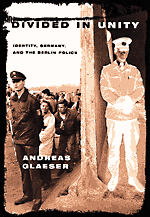Citations

A
Berlin wall still stands
In Divided in Unity: Identity, Germany, and the Berlin Police
(University of Chicago Press), Andreas
Glaeser ,
an assistant professor in sociology, provides firsthand accounts
of persistent divisions between east and west Germans as he accompanies
Berlin police officers on their daily patrols. His examples of
mutual distrust include easterners' fears that their western counterparts
are bent on taking away their leadership positions. Attempting
to explain the "wall in the heads of people," he says he chose
the Berlin police force as his subject because it represented
one of the few institutions where, riding alongside each other
in patrol cars, westerners and easterners have to relate to one
another as peers.
Too
much of a good thing?
A U of C study published in the April 11 Proceedings of the
National Academy of Sciences raises questions about the generally
accepted health benefits of bioflavonoids, water-soluble plant
pigments found in soybeans, fruits, root vegetables, herbs, and
some dietary supplements. Janet
Rowley, PhB'45, SB'46, MD'48, the Blum-Riese distinguished
service professor in medicine, molecular genetics & cell biology,
and human genetics, reported molecular evidence that bioflavonoids
can cause breaks in DNA that could trigger the onset of infant
leukemia. She notes that though the public-health message from
the study is not yet clear, the results suggest that pregnant
women should be especially careful about eating a diet or taking
supplements high in bioflavonoids.
Genetic
hide-and-seek
Also in the April 11 Proceedings of the National Academy of
Sciences, San
Ming Wang, an assistant professor in medicine, reported
that researchers at the U of C and Johns Hopkins have developed
a technique to speed the search for unknown human genes. The technique--called
"Screening poly (dA/dT)-cDNAs for Gene Identification"--is expected
to play a critical role in identifying the remaining third of
the estimated 140,000 genes now being catalogued in the Human
Genome Project. Essentially, the new technique allows scientists
to more easily move already identified genes out of the way so
that they can see the less common ones.
The
morality of Henry James
In his new book, Henry James and Modern Moral Life (Cambridge
University Press), Robert
Pippin, chair of the Committee on Social Thought, presents
his thoughts on James's understandings of morality and motivation.
He shows how James eschews skepticism to sensitively portray the
precarious and extremely confusing nature of modern morality,
offering new interpretations of The Portrait of a Lady, The
Wings of the Dove, The Ambassadors, The Golden Bowl, and several
of James's short stories.
Targeting
tumors
Intensive treatment combining radiation and chemotherapy can locally
control advanced head and neck cancers, improve survival, and
in most cases eliminate the need for surgery, report Chicago and
Northwestern researchers in the April 14 Journal of Clinical
Oncology. Study director and U of C Duchossois professor in
medicine Everett
Vokes reported that the combined-therapy approach
locally controlled the cancer for 92 percent of the 72 patients
treated by the researchers between 1993 and 1996 and increased
long-term survival to 55 percent.
Global
links
In Ruling the World: Power Politics and the Rise of Supranational
Institutions (Princeton University Press), Lloyd Gruber, an assistant
professor in the Harris School, explores questions of why and
how nations cooperate on political matters. Looking at the political
origins and structures of the new European monetary system and
the North American Free Trade Agreement, he discusses not only
issues of finance and trade but also security cooperation, environmental
politics, and nation-building.



![]()
